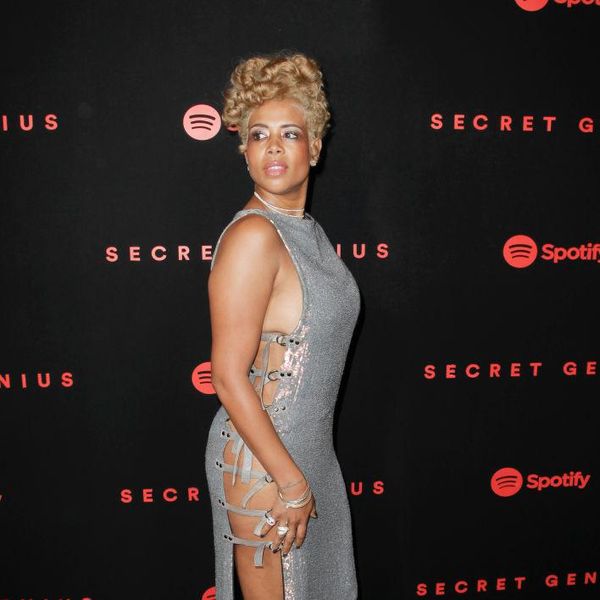Kelis Says Pushing Forward With Ideas That Others Don't Agree With Is The Secret To Success

The best part about being slept on is having the opportunity to wake motherf*ckers up, and Kelis is just the person to help us do it. The 40-year-old mother-of-two recently sat down with i-Dand reminded us that you should never give up on the dream just because other people weren't given your vision.
Kaleidoscope broke barriers when it was originally released in 1999 and our girl officially became the first girl to scream on a track, and twenty years later, Kelis reflected on the success of her debut album and what it meant to Black girls everywhere:
"The funny thing is, 'Kaleidoscope' doesn't fit in anywhere. It literally cemented me into musical history forever and I know that. It changed my life and the life of music for that era, because it made it so that black girls could look different and sound different and be different. It became about the artistry because it had to. Everybody understood that it had to live somewhere… I'd rather be critically acclaimed because it's so off, rather than having everyone like you right now and tomorrow they don't know who you are. I don't need that. This is perfect for my personality. It just works out this way because this is who I am."
The singer explained that at the time, although she had a sound that she vehemently believed in, records execs thought differently; but this didn't stop her from creating, even if it took the world a little longer to catch on. We can all learn a thing or two about owning your shit from the "Milkshake" singer, who says that she stands tall in her work, whether she sells two albums or two million.

"If I have an idea that's good, and I know when it's good, no one will agree with me. So every time, I'll do it and everyone's like, 'She's the weird one, there she goes again, why are you doing that when this is totally not like the record you did before?' I always say, 'I promise, everyone's going to want to be doing this.' It's literally two years, every single time."
The singer also emphasized the importance of making collaborators pay what they owe, friends or not. Kelis explained that despite any success that she had on her projects, she didn't see a dime of the profits. After releasing her music, she later learned that The Neptunes and her record label would retain all of her royalties:
"Fast-forward 10 years and I didn't think for one second, did I get paid for that? Were they fair to me? Did they give me what they said they were going to give me? Someone might argue that I was wrong, since I didn't ask the right questions. It's not a new story, it happens all the time. Unfortunately, it happens to women a lot, it happens to black artists a lot."
Thanks to the unlimited access to information that exists in the digital age, it makes it much harder for record companies to swindle young artists, but for Kelis, her financial mistake has to live on a lesson learned.
"We were Star Trak. I was Star Trak for life. I was like, this is what it is, this is fun. It was supposed to mean something. And then to find out later it meant nothing and was just the same old rhetoric and rigmarole that we're always hearing about, that it was essentially a modern-day Motown? Yeah, you're freaking amazing and you're talented and interesting, and you have nothing, because you didn't know to ask for anything. Whose fault is that?"
To read the full interview, click here!
Featured image by Tibrina Hobson/Getty Images
Taylor "Pretty" Honore is a spiritually centered and equally provocative rapper from Baton Rouge, Louisiana with a love for people and storytelling. You can probably find me planting herbs in your local community garden, blasting "Back That Thang Up" from my mini speaker. Let's get to know each other: @prettyhonore.
Reset Your Relationship: How To Start 2025 Strong With Your Partner
As the calendar turns and a new year unfolds, many of us are laser-focused on our career goals, fitness resolutions, and vision boards that outline the journey to our best selves. But amidst all the planning and self-improvement, have you made room for another important part of your life? Your relationship.
It's easy for couples to fall into a routine, going through the motions and letting their connection sit on autopilot. While comfort is natural in a long-term relationship, it’s important to remember: that what you don’t nurture, eventually fades. So, why not make 2025 the year you reset your relationship? Here’s how to start the year with a renewed bond, reigniting the spark that brought you together.
Step 1: Schedule Your Reset Meeting
The first step to hitting the reset button is a State of the Union meeting with your partner. This is your chance to take a pulse on the relationship, discuss what's working, and identify areas that need attention. It’s all about creating space to reflect, without distractions.
Grab a pen and paper (or open a shared note on your phone) and come prepared to share your top 2-3 desires for your relationship.
What do you both want to feel more of in 2025? Maybe it’s feeling more appreciated, or perhaps you want to reignite the passion you had when you first started dating. Whatever it is, get clear about it, and make sure both of you are on the same page.
This isn’t just about listing your own wants, it’s also about discussing ways to nurture each other’s needs. Relationship goals should be focused on fostering deeper intimacy, trust, and mutual respect. Use this time to check in, not only with each other but with your individual feelings and expectations. Set the foundation for a fulfilling year ahead.
 Alistair Berg/Getty Images
Alistair Berg/Getty ImagesStep 2: Set A Date (Or Multiple!)
Having the meeting is only the first step. Now, it’s time to take action. One of the simplest ways to breathe new life into a relationship is by reintroducing consistent, intentional time spent together. For many couples, life gets busy, and date nights fall by the wayside. But dating doesn’t stop when you say "I do"—in fact, it’s even more essential.
During your reset meeting, lock in a regular date night that works for both of your schedules. This could be a weekly dinner date or an every-other-week adventure—whatever keeps things fresh. The goal is consistency. It’s easy to push date nights aside when life gets hectic, but if you set a specific date each week or month, you’re making your relationship a priority.
If you’re unsure what to do for your date nights, don’t worry! The key is creating new experiences together. This is what sparks excitement and brings you closer as a couple. Whether it’s cooking a new recipe together, trying a dance class, or exploring a nearby town, it’s about creating shared memories that build your connection.
 Getty Images
Getty ImagesStep 3: Find an Accountability Partner
Just like you might have a personal trainer to help you crush your fitness goals, an accountability partner for your relationship can do wonders for keeping both of you on track. Consider hiring a marriage coach or therapist—someone who can meet you where you are and guide you in strengthening your relationship.
When selecting a professional, it’s important to choose someone who truly wants the best for your marriage and can provide actionable advice.
Don’t be afraid to set high standards for your relationship, and seek guidance on how to keep it thriving for the long haul. In your reset meeting, discuss your commitment to growth, and be honest about areas where you may need support.
Marriage isn’t a set-it-and-forget-it endeavor—it’s an ongoing process. Regular check-ins with a professional can help keep your relationship in tip-top shape and “divorce-proof” by addressing issues before they become insurmountable.
 DMP/ Getty Images
DMP/ Getty ImagesStep 4: Try Something New Together
Stale routines can easily make a relationship feel monotonous. Spice things up by trying something new! Couples that explore new activities and create new memories together have stronger, more fulfilling bonds.
My husband and I host one of the top luxury marriage retreats, A Weekend For Love, designed to help couples experience new things together. From couples' workshops to outdoor adventures, the retreat provides a platform to rediscover each other and reconnect on a deeper level.
The element of surprise can reignite your connection. It’s exciting, fresh, and shows your partner that you’re committed to growing together. This doesn’t have to be a huge commitment—it could be as simple as trying a new hobby or planning an impromptu weekend getaway.
Your Relationship Should Be A Priority
As you start the year with personal goals in mind, don’t forget the importance of nurturing your relationship. It’s easy to get caught up in work, fitness, and family obligations, but your bond with your partner deserves to be at the top of your list. Resetting your relationship offers an opportunity to reignite that spark and remind each other why you fell in love in the first place.
In 2025, make a commitment to prioritize your partnership, to nurture it daily, and to invest in its growth. Take time to celebrate each other’s victories, support one another’s dreams, and build a foundation of love and respect. When you start the year with a clear focus on your relationship, you’re setting it up for success.
So, before you start mapping out your new workout plan or work goals, do yourself a favor: put your relationship at the top of that list. Your love story deserves a fresh start, too.
Happy New Year, and here’s to a love-filled 2025!
Couples, if you are ready to do the work and invest in your relationship register for A Weekend For Love: Heart Retreat Feb 21-23, 2025.
Featured image by zamrznutitonovi/Getty Images
Phase Of Life: I Thought I Was Falling Apart—Then I Learned What Was Really Happening To Me
When it was announced, “Class of 2023, you may now turn your tassels to the left,” that was the moment I realized s**t just got real. Even in the midst of celebrating with family, friends, and professors who had watched my personal and academic growth over the past three-ish years, I was already thinking about how excited I was for my next chapter.
To avoid making others feel more pressure about their post-grad plans than they already did, I withheld revealing that I’d already secured a full-time job six months before graduating and I’d gotten accepted to graduate school. I didn’t know that this lack of celebrating my accomplishments would impact how I’d embrace special moments in the future.
As I continued navigating my way through my post-grad journey, I found things in my life began to get harder and harder. It was one challenge after the next: I was adjusting to a new day-to-day routine. A romantic relationship drastically ended. I lost friends I thought I’d have forever. I had to grieve the loss of a loved one.
It was as if someone had abruptly stopped the record on the player, and the confused look you’d usually see on people’s faces was exactly how I looked after coming to my second realization that this was the worst I’d felt in a long time, if not ever.
Like everyone else, I’d previously experienced sad moments and life stressors related to my personal and professional life, but for some reason, this time felt different.
Even in my own strength of distracting myself with self-care tactics and support from friends, nothing seemed to stop my constant tears or heart from aching. Before long, I was waving my white flag at God and decided that these burdens were just too heavy for me to carry on my own. Therapy was something I was already familiar with, but I hadn’t scheduled it into my new life yet.
After the standard get-to-know-you sessions, it was time to get to the nitty gritty with my therapist. What’s really going on? Nothing could’ve prepared me for what she had to say next.
'Phase of Life' and Adjustment Disorder
When the words “phase of life,” escaped from my therapist’s mouth, it surprisingly felt more enlightening than heavy. Sure, I felt like I was spiraling, and nothing connected to me seemed to be going well, but at that point, I knew what was going on with me.
Associated with the "phase of life," adjustment disorder is something I had to discuss with my therapist to talk about what the next steps for me looked like.
After doing this, I felt reassured but nervous. I’d never been diagnosed with anything mental health-related before and didn’t want this to be the starting point of a cycle that I wouldn’t be able to get out of.
According to Healthline, adjustment disorder is a person’s temporary grouping of conditions in response to a stressful life occurrence. This can usually be seen as multiple events that have happened back to back or a singular event that’s taken a larger precedent. I personally experienced adjustment disorder with anxiety and a depressed mood, proving itself to be impacting my life more than I'd realized.
So many times as Gen Zers, we get told the generic rhetoric of, “You’re so young. Just live your life,” or “You have so much life to live. Stop putting so much pressure on yourself.” In reality, not only do I not feel that way, but it honestly just makes my feelings stronger and leads to a desire to constantly prove myself, especially as a Black woman.
The pressure and expectations surrounding being well-established and accomplished are always the heaviest burden.
Dr. Judith Joseph, a clinical psychiatrist and author of High Functioning, believes that post-grad depression is synonymous with adjustment disorder and that the condition is not confined to a specific age group or demographic. “In certain situations, let's say, college students, they tend to have more adjustment issues because they're going from one situation, like being at home, being cared for, to being completely independent, so to speak, in a new setting, and around new friends, not around family,” she said.
Early signs of adjustment disorder may look like feelings of hopelessness, avoidance of friends or family, or even feelings of anxiety and crying often— all of which I was experiencing. “Adjustment disorder can come as the depressed type or the anxious type. If you have the depressed type, you're gonna have symptoms of depression, like low mood, low energy, poor concentration, guilt, hopelessness, problems with your appetite. … The anxious type will have symptoms of an anxiety disorder, like stomach ache, headache, breathing fast, worrying, palpitations, [and] inability to relax.”
Adjustment Disorder, Social Media, and Gaining Understanding
These symptoms can also get heightened with the usage of social media as many people compare their lives to others.
While seeing others’ success can be inspiring, it can also be detrimental to one’s authentic journey by trying to emulate or align themselves with societal expectations, values, and beliefs. “The difference between adjustment disorder with anxious symptoms is that when the stressor goes away or the person becomes accustomed to the situation, the symptoms go away. But if it's more persistent, then it's likely not related to a stressor. It's a persistent condition like generalized anxiety disorder,” Joseph added.
When getting diagnosed with adjustment disorder, it is recommended to implement stronger levels of self-care along with finding supportive people around you, such as friends, family, and colleagues, to help you through the transition.
What was also helpful for me in my journey was being more patient with myself in those tougher times, giving myself grace, and humanizing myself. The superhero complex of Black womanhood, in my lens, does not start at the legal age of 18. It begins with the first iterations you have of female figures in your life. Your mother, grandmother, aunts, sisters— all of these women in some way demonstrated the example of saving everyone else and only sometimes putting themselves on the check-in list, if ever.
While it sounds taboo to some to take your mental health seriously, I’ve learned that doing so not only saves your life but the lives of those around you.
Joseph recommends not only being aware of your personal and family mental health history but also determining ways to avoid taking on so much at once. “The other thing you can do is if in preparation for a big change, try not to make so many different changes happen at once,” she said. “So I've had patients who they're not only moving to a new place, but they're starting a new job and it’s like that's a lot of change. And then they're like, ‘Well, maybe it's time to break up with my boyfriend.’ … You may wanna spread out your change.”
She also recommended being proactive toward the impact of life changes by giving a heads-up to those around you. Whether this be family, friends, or a significant other, being able to lean on others during times of transition makes a difference, especially as someone who may have experienced this before. The symptoms of the disorder can return with another big life change.
In the words of Megan Thee Stallion, “Bad b**ches have bad days too,” and this reigns true for me now more than ever.
My character, demeanor, and core as a person don’t change just because of a bad season or hard times. The confidence I have in high moments should be the same level of confidence I have in other areas of my life. As I continue on this journey of self-growth, life changes, and knowledge of the world around me, I’m reminded of where I started on the road to getting where I want to be.
The bounce back is always going to happen, but there’s a difference between a bad day and a bad life, and hard times don’t last forever. It just feels like forever in the moment.
Let’s make things inbox official! Sign up for the xoNecole newsletter for love, wellness, career, and exclusive content delivered straight to your inbox.
Featured image by Delmaine Donson/Getty Images









